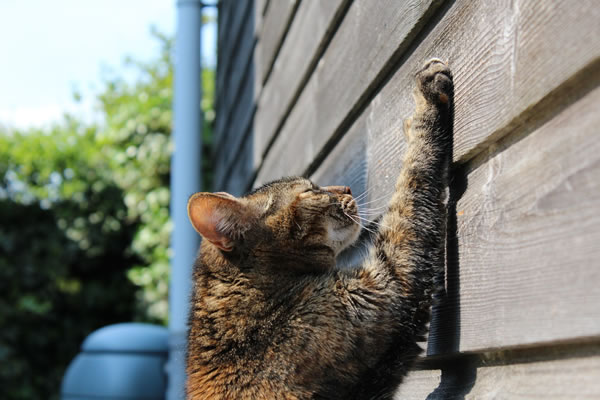 Cat owners, understandably, feel like
Cat owners, understandably, feel like
ripping their hair out every time they see a new piece of furniture scratched and torn at the paws of their big-eyed feline friend. Although this can be a natural trait for most cats, it is sometimes a learned behaviour that can be addressed.
We contacted our friend and expert animal behavourist, Dr Joanne Righetti from Pet Problems Solved, to give us some tips about how to understand cat scratching and what to do to curb the claws.
-
Understanding cat scratching
Cats scratch. This is normal behaviour, When your cat scratches your furniture, it is also normal to feel annoyed. Behaviours need to change!
There are several reasons why cats scratch:
- to maintain the health & sharpness of their claws
- to place their scent on objects surrounding them
- to stretch & burn off energy
- to defend themselves
- because they enjoy it
Cat scratching: a natural behaviour
Cat scratching is a normal, natural behaviour. Even large wild cats eg. lions, scratch. Most outdoor cats choose to scratch on tree bark. Bark is not always accessible to indoor cats and some cats just like to scratch when inside.
Cat scratching: a learned behaviour
In addition to being a natural behaviour, cats also learn to scratch. They learn to scratch where it feels good, including your sofa, carpet or curtains. They may learn to scratch to feel good, when they awaken and stretch or when they enter a room. They may learn to scratch to get their owner’s attention.
-
Cat scratching you?
If your cat scratches you it may be due to aggression and/or anxiety. Scared cats will often lash out at the perceived threat. Working on reducing their anxiety will help reduce the amount of attacks on you or other animals. Attack cats often enjoy the game. They use this aggression to win resources or to get attention. Understanding cat aggression may help you understand your cat’s scratching.
-
Main reasons for cat scratching
Health and wellbeing
Scratching with the claws removes the dead claw sheaths and allows the newly grown claw to emerge – nice and sharp! Cats need sharp claws. Claws enable cats to climb and to hunt. Of course, most owners don’t encourage their cats to be predators but there is no doubt that cats still enjoy the use of their claws in hunting games.
Scent marking
One of the most important functions of scratching is to deposit scent. Cats have scent glands on their paws. Scratching leaves their scent on objects that they have scratched. While this is a natural behaviour, it may also be helpful for cats who are anxious. Having their own scent surrounding them can make scaredy cats feel more secure.
Defence – and attack
Cats may also need to defend themselves against enemies. Many cats will lash out with their claws when they feel threatened. And sometimes it’s all just part of their game!
Energy release & stress relief
Cats often scratch their claws when they first awaken and rise. They may also scratch when they enter a room or come back indoors from outside. This is a form of scent marking. it places their own scent in the room and/or on the object and makes them feel all is right in their world. Scratching burns off energy that might otherwise need to be used in hunting, climbing, playing and attacking.
About Dr Jo Righetti
Dr Jo is an animal behaviourist who understands the human-animal bond and helps people with their pets. For the last 20 years Dr Jo has provided pet owners with answers to many of their pet concerns through her business and blog: Pet Problems Solved.